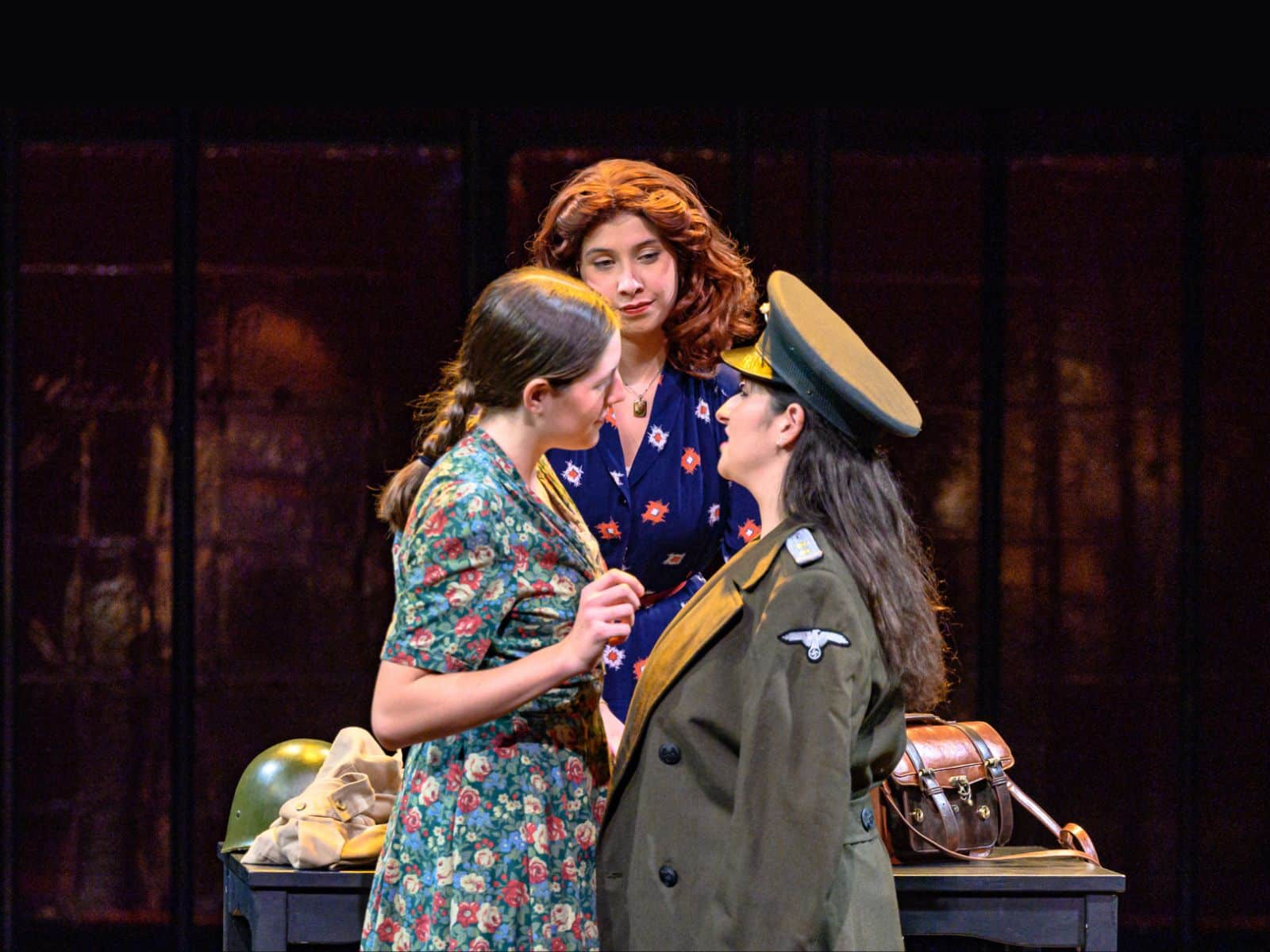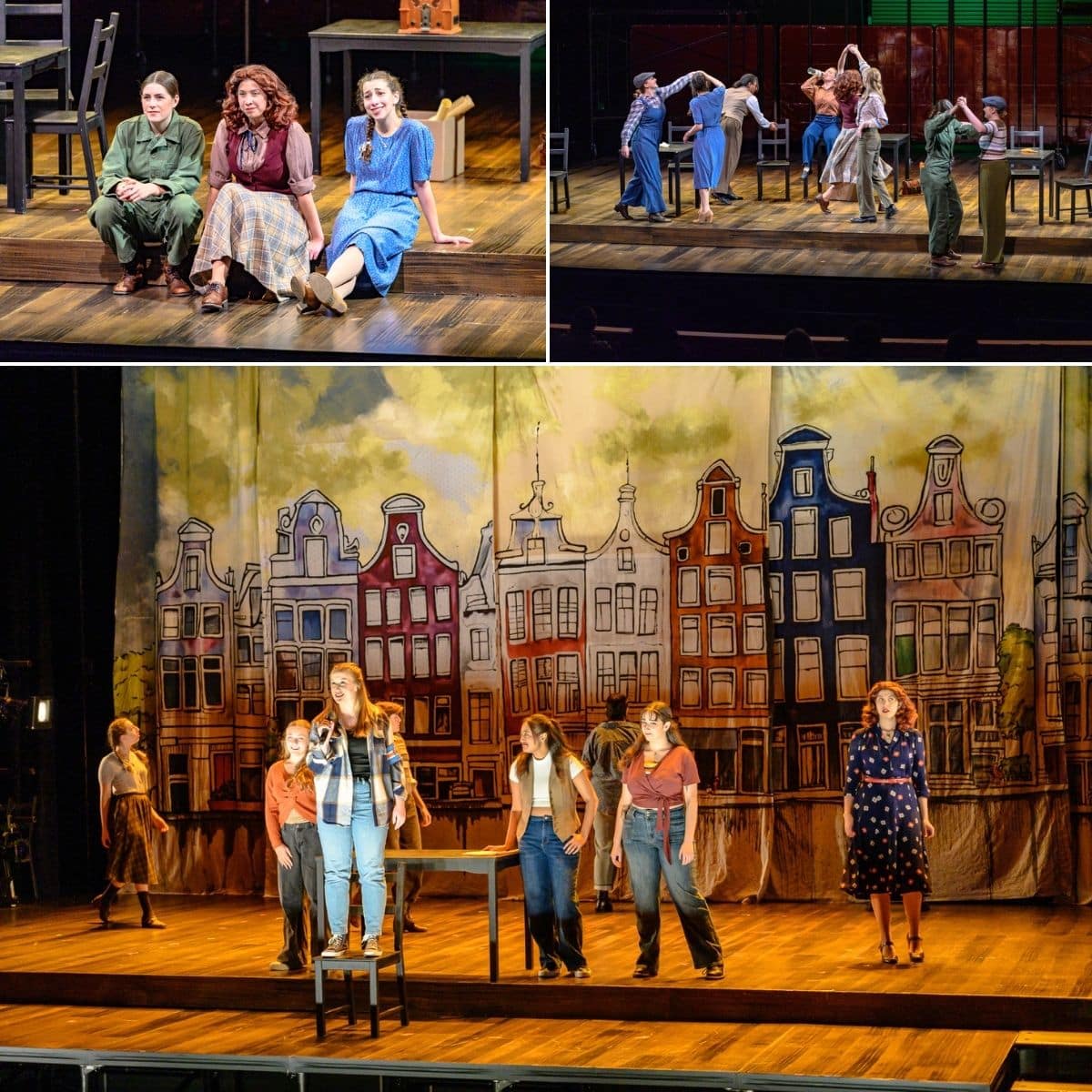“The past is never as distant as we imagine.”
“Resistance is not only about weapons or battlefields. It is about imagination — the belief that a different world is possible and worth risking everything to create.”
These words from dramaturg Lindsey R. Barr’s program notes for the American University production of Disarming Girls frame the subject matter that will be explored during the play’s 90 minutes.
How do we resist efforts to take over and manipulate our lives and welfare? Can knowing what was done in the past inform and inspire our present efforts around this issue?
There are good reasons that students and faculty at American University have been excited about this production for weeks.

Of course, having Aaron Posner — a DC theater treasure — as a member of your creative and production team is grounds enough for excitement. But in addition, this production also acknowledges the support of Imagination Stage, Olney Theatre, and The George Washington University. So, it looks like the success of this production is the result of collaborations across skills, disciplines, and communities. The ideas of “community” and “empathy” these days have been the target of a resurrection of a Margaret Thatcher-type disdain. We are currently living under a government that is gleefully terrorizing its people, taking note of all of the intersectionality of the nation’s people — shared experiences that could be used as ways to unite them — and choosing instead to manipulate those commonalities as ways to divide them. I have heard many people on many podcasts ask, “What can we do?” In the context of the current times, acts of collaboration such as the one explored in the process that gave us this performance can be seen as examples of resistance.
Disarming Girls tells us the true story about a group of young women who, exploiting the roles that girls and women have been assigned in Western culture, figured out something they could do. Within those pre-determined roles, these girls figured out ways to collaborate in their resistance against the Nazis even though as a citizenry and as women they seemed powerless. This need to find a useful and effective method of resistance must have seemed an especially relevant plot point as Washington, DC, anticipated people pouring into the city for a second No Kings march.
As the audience entered the theater, we saw a painter’s dropcloth casually draped against the upstage wall. But instead of the splotches of paint that we usually expect to see on a dropcloth, there is a painting of the Canals of Haarlem, the city where the play takes place. So, it was as if we were looking through the proscenium out into the city. The artificiality of the painting’s presence amplified any leaning toward nostalgia the audience might have had. In a way, the audience is enticed to co-create the reality of this space.

Hannie is the central character in this story. She has stalked and eventually approached Franz, the leader of the resistance in the Netherlands. She forces Franz to consider her as a participant. At first, there is skepticism. But it turns out that she’s a crack shot and speaks several languages, including German. Eventually, the resistance group stumbles upon a strategy of disarming German soldiers that proves to be extremely effective, and three of the girls (Hannie, Truus, and Freddie) are enlisted to carry it out regularly. It is a dangerous strategy that makes the girls highly vulnerable, but because it is so effective, it’s a strategy that they pursue almost until the end of the war.
The script by Sarah Caroline Billings and Kallen Prosterman is stylized, utilizing a chorus to play various incidental characters and to portray crowds and to concretize or embody feelings.
The scenes move from place to place and time to time rapidly. This creates a puzzle for how to move the scenes while at the same time maintaining some kind of believability.
But it is energizing to watch as this company solves this puzzle playfully and resourcefully. Director Jenna Place has drilled these performers. They move from scene to scene and from moment to moment with a military-like precision, focus, suppleness, and speed. The bodies of the actors — aided greatly by the costuming — hold the intent and feeling of the characters that the playwrights have evoked.
Sydney Moore’s costuming is almost photographic in its evocation of the era. The costuming is supported every step of the way by makeup and hair styling, and further amplified by Jesse Belsky’s sepia-tinged lighting touches. All of it encourages a willing suspension of belief on the part of the audience.
Scenic designer Samina Vieth uses rolling scaffolding, boxes, and platforms that morph the performing space into various locations and objects as needed on a moment’s notice. I especially enjoyed the illusion of automobiles traversing under and around each other. Deaths and killings happen in this play. They were represented by slips of cloth dropping, floating away from or being snatched out go a previously living character’s hand. There is no re-traumatizing or glamorizing of violence or death in this story of human rapaciousness. Instead, emphasis is placed in the storytelling on noticing the suffering, loneliness, cruelty, and courage of the war participants and victims.
We won that war, you know.
Running time is approximately 90 minutes without intermission.
Disarming Girls plays to 26, 2025, presented by the American University Department of Performing Arts, performing at the Harold and Sylvia Greenberg Theatre – 4200 Wisconsin Avenue NW, Washington, DC. For information about future events, call 202-885-ARTS (885-2787) or visit the website.
Tickets are free for AU students; $10 for children (under 18), seniors (over 55), AU alumni, staff, and faculty; and $15 for the general public.
The program for Disarming Girls is online here.
Disarming Girls
By Sarah Caroline Billings and Kallen Prosterman
Directed by Jenna Place
CAST
Lucille Rieke: Truus; Maddy Cooper: Hannie; Mira Gross-Keck: Freddie; Shelly Wiese: Franz
ENSEMBLE
Laurel Brown, Iliana Cardoso, Gabriela Cohen, Bitaniya Menkirs, Lan Mourad, Ainsley Noven, Madelyn Ruyle, Sophie Laurence
CREATIVE AND PRODUCTION TEAM
Director: Jenna Place
Assistant Directors: Morgan Kullen and Olivia Morrison
Stage Manager: Quinn Laubach
Assistant Stage Manager: Siena Johnson
Fight Choreographer: Robb Hunter
Intimacy Director: Sierra Young
Dramaturg: Lindsey R. Barr
Scenic Designer: Samina Vieth
Lighting Designer: Jesse Belsky
Sound Designer: Jordan Friend
Properties Design: Mason Dennis
Costume Design: Sydney Moore
Stage Manager Advisor: Martita Slaydon-Robinson
Theatre/Musical Theatre Artistic Director: Aaron Posner
Theatre/Musical Theatre Program Director: Jason Arnold
GREENBERG THEATRE STAFF
Technical Operations Manager: John Stahrr
Lighting & Audio Coordinator: Kassie Bender
Costume Shop Manager: Sydney Moore
STUDENT PRODUCTION TEAM
Production Assistants: Jackson Smith and Emmett McNulty
Light Board Operators: Aaron Miller, Alisté Bills and Emmett McNulty
Wardrobe Head: Finn Fairfield
Wardrobe Crew: Emme Fischer, Ivy Collins, Allison Evans, and Justine Lee
Fight Captain: Shelly Wiese
Sound Board Operators: Twain Steven and Alisté Bills




